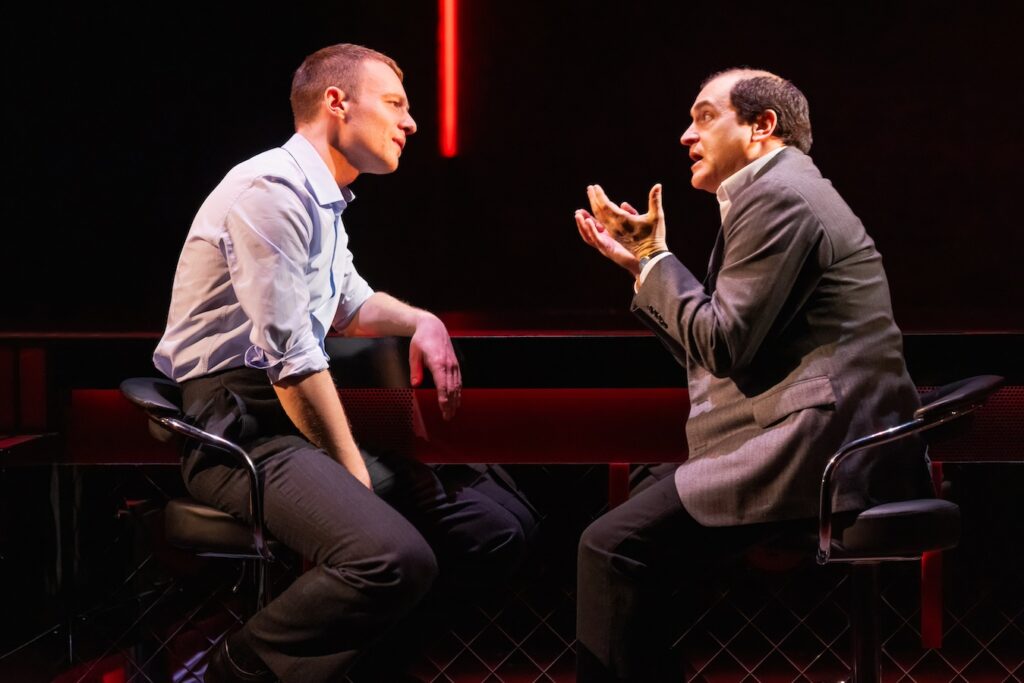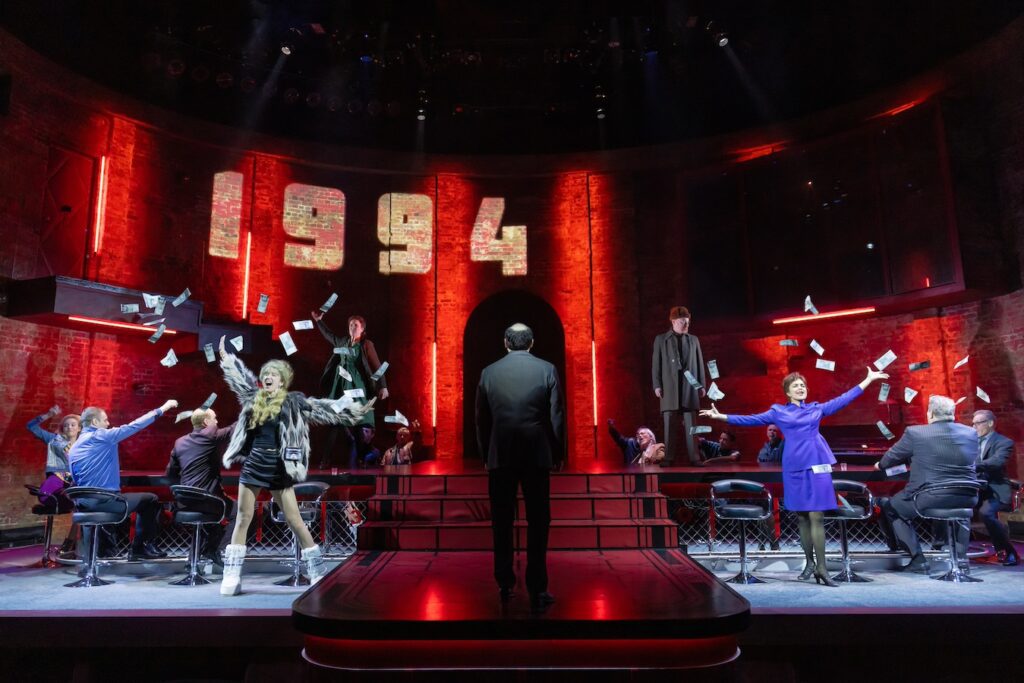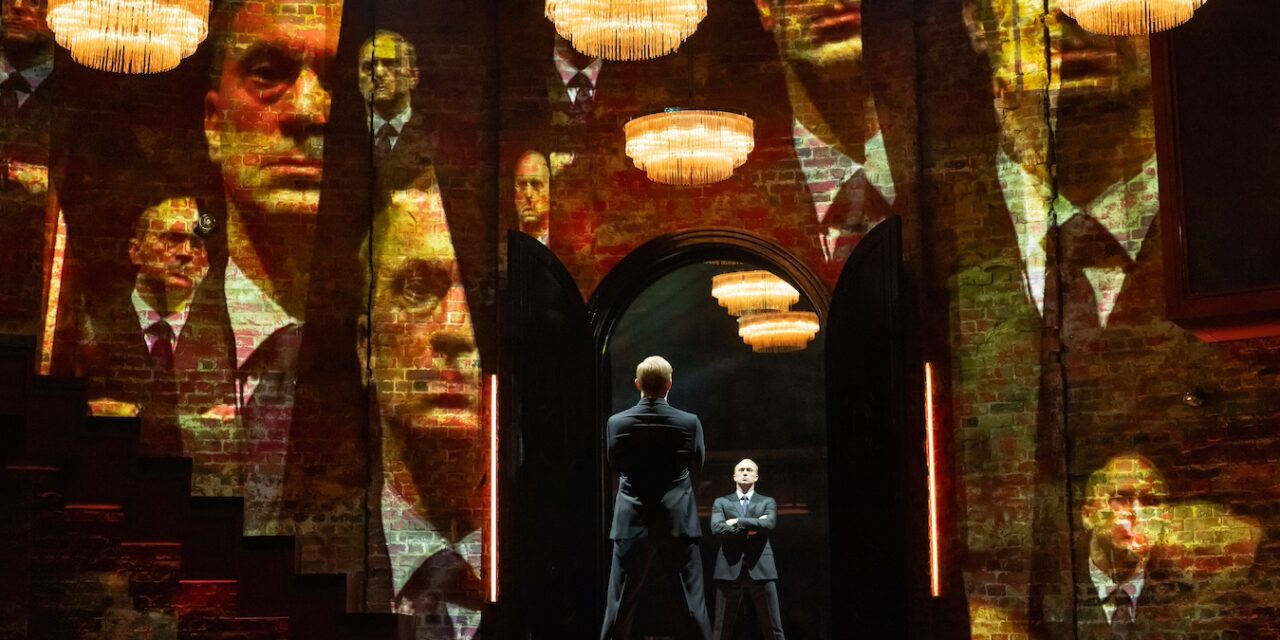Theater Review by Samuel L. Leiter . . . .
I suspect that, if the category for Final Jeopardy were “Russian Oligarchs” and the clue was, “Mathematical prodigy who claimed responsibility for helping Vladimir Putin become President of Russia,” the responses would be something like “Who is Boris Baryshnikov,” “Who is Boris Yeltsin,” and “Hi, Mom. It’s been fun.” Just getting the Boris part right would be an achievement; how many people do you think, even “Jeopardy” contestants, would ask, “Who is Boris Berezovsky”? Even after seeing Patriots, Peter Morgan’s (TV’s “The Crown”) heavy-handed British bio-drama about the Russian-Jewish billionaire, it takes time for the name to settle in.
Patriots premiered in London’s Off-West End, under Rupert Goold’s direction, starring Tom Hollander as Berezovsky and Will Keen as Putin, and is now at Broadway’s Ethel Barrymore Theatre with Michael Stuhlbarg taking over as the oligarch. As for why Morgan chose to write a two-and-a-half-hour play about this little-known, albeit influential, person, the answer, of course, must be not so much Berezovsky himself, but his connection to the ever-newsworthy Putin, a former KGB intelligence officer who was deputy mayor of Saint Petersburg when he was plucked from relative obscurity to become prime minister in 1999.

Putin became acting president in 2000 after Boris Yeltsin resigned, followed within months by his own election to the position. Except for four years, between 2008 and 2012, when he was again prime minister, he’s been Russia’s president, making him one of the most powerful—and feared—dictators in the world.
Patriots, however, is more concerned with the personality and career of the colorful Berezovsky, who allegedly saw in Putin—shown at first as an unbribable, pro-West individual—someone whose political leanings would have benefited him and his billionaire allies, while expanding Russia’s liberal policies, including the existence of a free press and opposing political parties. (Berezovsky, in fact, was only one of several oligarchs responsible for supporting Putin, but Morgan chose to emphasize him because of his personal flamboyance.)
Once Putin is in power, however, he becomes increasingly authoritarian and anti-West, crushing dissent, both from the press and other politicians and suppressing economic reform and oligarchic influence. The play focuses on the essential conflict between the idealistic Berezovksy’s Dr. Frankenstein—as Morgan conceives him—and the monster he created, each claiming to be the patriot the other is not.


Berezovksy’s questionable business methods in oil, automobiles, and media, especially his dealings with a younger oligarch named Roman Abramovich (Luke Thallon), with whom he partnered in the ownership of the national TV station ORT, also get much attention. Berezovsky’s friendship with Putin crumbles in vicious confrontations where (in Stuhlbarg’s over-the-top performance) the generally arrogant, unpleasant oligarch—who screams a lot—furiously demeans Putin, only to be hoisted by his own petard. Putin recognizes that his nemesis cannot accept having “created someone to whom he has to bow down.”
Then—after fleeing Russia for self-exile in England, which he hates—Berezovsky does legal combat with Abramovich, whose krysha (a form of protector) he’d been. The younger man has taken over the elder’s share of their enterprise, using their TV network to glorify Putin and cover up his lapses. This leads to a High Court suit against Abramovich (“the largest civil lawsuit in recorded history”), seeking to regain his money, which Berezovsky loses ignominiously, costing him his fortune.
While in England, Berezovsky also supports Ukraine’s anti-Russian “Orange Revolution,” enraging Putin; but it’s not long before Russian assassins begin their work on Putin’s enemies. Berezovsky himself—earlier in his life the victim of a car bombing—named number one on their hit list, is found dead by hanging, although people still debate whether it was suicide or murder. Morgan decided to leave his death ambiguous. On the other hand, security specialist Alexander (“Sasha”) Litvinenko (Alex Hurt), Berezovsky’s ally in England, is definitely poisoned, his suffering described in phone calls between his frantic wife (Stella Baker) and Berezovsky.


Stuffed into this flood of historical background is a thematic gloss created by frequent references to the oligarch’s mathematical theories regarding decision-making—the point being that, for all his theorizing, he keeps making the wrong decisions. Putin to Berezovsky: “You make one bad choice after another.” There’s also more thematic chit-chat about “infinity,” not to mention confinement and freedom, which only serves to further bloat the writing.
Viewed in summary, this politico-historical material will have some interest for many, if not necessarily for the kinds of audiences typically drawn to Broadway fare. But as a play, its coverage of multiple issues is so compressed it becomes more like a highlight reel than an organic drama; that impression is emphasized by the larger-than-life epic theatricality imposed on it by Rupert Goold’s overstated production, which, to get it all in, simplifies the characters and situations, and goes for the jugular in one confrontation after the other. It would work much better as a miniseries than it does as a play.
Miriam Buether has designed a dungeon-like set of brick walls in a semicircular arrangement dominated by a table-like platform that occupies almost the entire width of the stage and serves for whatever locale is needed. She and Deborah Andrews are responsible for the suitable costumes. Jack Knowles lights the show for ultimate dramatic, not realistic, effect; and Ash J. Woodward provides multiple video projections—including news broadcasts—to supplement the visual interest. Credit for the choreographed movement sequences goes to Polly Bennett.


Most egregiously, Michael Stuhlbarg’s performance, which—like his cast mates—uses a British accent (it’s certainly not a Russian one), is such a nonstop parade of actorish shtick, sharp changes in intonation and volume, and cutesy gestures and movements, that he tips the scale into charmless obnoxiousness. By contrast, Will Keen’s Putin, who actually comes off as more human than his opponent, is a precisely crafted portrait that, for the most part, is modest and restrained, with an ever-present undertone of foxy cunning. At one point he finds a way to carry himself when standing and walking that brings the swaggering Putin before us in three dimensions.
The others in the large company, many of whom play two or more roles, give acceptably polished performances within a broad style requiring telegraphic portrayals that get the characters across in a few basic strokes.
Patriots offers a lesson about recent Russian history whose subject may not be what audiences at the jam-packed end of the current season are looking for. Its antihero’s name, however, will give future “Jeopardy” contestants a piece of trivia to stash away in case it one day comes in handy.
Patriots. Through June 30 at the Ethel Barrymore Theatre (243 West 47th Street, between Broadway and Eighth Avenue). www.patriotsbroadway.com
Photos: Matthew Murphy


















